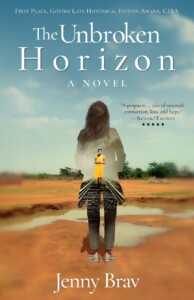 In my debut novel The Unbroken Horizon, first place winner in the CIBA awards for late historical fiction, one of my main characters goes on a journey to heal her childhood wounds, In the following passage, Sarah, a 34-year-old humanitarian nurse, has just re-read journal entries from when she was thirteen. At the time, her father had just died of a sudden heart attack, and her surgeon mother decided to take a Fellowship in Paris, and cart her grieving daughter half-way across the world.
In my debut novel The Unbroken Horizon, first place winner in the CIBA awards for late historical fiction, one of my main characters goes on a journey to heal her childhood wounds, In the following passage, Sarah, a 34-year-old humanitarian nurse, has just re-read journal entries from when she was thirteen. At the time, her father had just died of a sudden heart attack, and her surgeon mother decided to take a Fellowship in Paris, and cart her grieving daughter half-way across the world.
As you read it, I invite you to feel into what age (or age range) is clamoring for your attention? What beliefs was that child part developing about him/herself? What would you want the younger you to know? What new beliefs would you like to replace the old ones with?
I closed the journal, feeling a tight ache in my heart, reliving both the powerlessness and the rage. My mother loved structure and precision, hence her career as a surgeon. She couldn’t stand the messiness of emotions. Teenage drama especially got her hackles up, so I had had to swallow my indignation and go along with whatever decision she made, all the while fuming inside. I didn’t think my mother had ever been an adolescent. I imagined her born with a scalpel in her hand and a string of obsequious interns hanging on her every word.
Leaning into that time in my life and remembering my session with Patrick [her therapist], I wondered what my younger self was learning then. I reopened the journals and reread the last entry.
“Thirteen-year-old Sarah. What are you learning?” I asked, and closed my eyes.
After a second or two, the words started coming. Opening my eyes again, I grabbed my current diary, and started writing what came to me without thinking too much:
“I can’t trust anything.”
“I will lose the people I love. There’s no point in getting too attached.”
“I have to forget the past and keep moving forward, no matter the cost.”
I paused, noticing a tight lump in my chest. My breathing was shallow, and with great effort, I attempted to slow it down.
“You still live your life that way,” I berated myself. From my work with Patrick, I was starting to see the ripple effect of that belief into the next twenty-plus years of my life.
I felt overwhelmed. Could I really heal that pattern? It felt so deeply ingrained. And if I did, who would I be?
Next to the February 28 entry, I wrote a possible new belief for myself.
“What if it’s safe to trust?”
I put my hands on my heart and whispered to my thirteen-year-old self: “That’s what I want for you.”
“Yeah, right, as if!” I imagined my teenager retorting.
My legs were feeling antsy and tight again, so I decided to go for the run I’d skipped earlier. When I came back, I felt a little lighter and calmer.
© Jenny Brav

